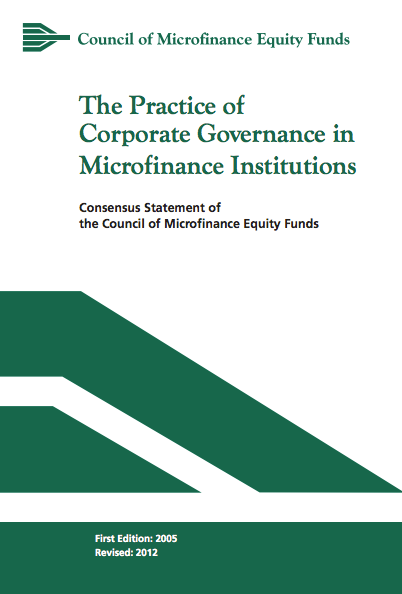The Investing in Inclusive Finance program area promotes good governance practices within the microfinance and financial inclusion industry. Such efforts include:
Africa Board Fellowship
A regional fellowship program is being designed to strengthen the governance of financial institutions serving low-income clients in sub-Saharan Africa. The fellowship will provide board members and CEOs with an opportunity to share experiences and learn from each other through peer learning seminars and ongoing engagement.
Governance Working Group
The Governance Working Group (GWG) aims to bring together leading experts and initiatives to address the challenge of improving governance in the industry. The GWG coordinates the different governance initiatives in the financial inclusion industry, conducts research to advance the state of knowledge and practices, and engages with different stakeholders to implement and improve practices.
The Art of the Responsible Exit in Microfinance Equity Sales (April 2014)
The Art of the Responsible Exit in Microfinance Equity Sales examines the question many investors grapple with: What does it mean to “responsibly” exit an investment? This paper is a joint effort of the Consultative Group to Assist the Poor (CGAP) and the Center for Financial Inclusion at Accion (CFI) to open this question for discussion and debate within the financial inclusion industry. Over 40 interviews with investors and industry experts were conducted to hear their perspectives on what a responsible exit means to them. While the answers varied greatly, it was evident from these interviews that many investments become deeply personal, and exiting them can be very difficult. In many cases, interviewees could more easily describe examples of an irresponsible exit, but found it harder to define the key parameters of a responsible exit. We believe that this is at least partly because the topic of exiting responsibility is still relatively new, and the questions it raises haven't been fully considered yet.
This paper is not intended to prescriptively outline what it means to exit responsibly, as it is inevitably up to every investor to answer this question for themselves. However, we hope that it will provide investors with helpful insights – or at least thought-provoking questions – as they face the tough reality that they might not be able to provide the support, expertise, or finances their investments need anymore, and it may be time to let them go.
Weathering the Storm
 “Learn from the mistakes of others. You can’t live long enough to make them all yourself.”
“Learn from the mistakes of others. You can’t live long enough to make them all yourself.”
-Eleanor Roosevelt.
Weathering the Storm examines seven case studies of MFIs from around the world that have encountered – and in some cases, overcome – extremely challenging situations that resulted from rapid growth and other causes. The paper, published in 2011, aims to understand the root causes, consequences, and context of failures or near failures and to extract common lessons from each institution’s experience.
CFI initiated the Weathering the Storm project because the industry lacked a body of knowledge on the topic of crisis, particularly those accompanying rapid growth. These experiences need to be openly discussed in order to avoid future failures. The project extends the work begun by a team led by Beatriz Marulanda in Taking the Good from the Bad in Microfinance: Lessons Learned from Failed Experiences in Latin America. Weathering the Storm moves beyond Latin America to examine a global sampling of institutions.
Seven Case Studies
Weathering the Storm is based on seven in-depth case studies from Ghana, Nigeria, Morocco, Europe and Central Asia, Kazakhstan, Pakistan, South East Europe, and three mini-cases of MFIs from Benin, the United States, and Indonesia, that have at one time been on a path towards crisis. By focusing on the challenges and conditions each institution faced, as well as how they handled the crisis - and in some cases were able to save the institution - the paper provides important survival lessons that apply broadly to MFIs facing crisis.
The paper was generously supported by the Calmeadow Foundation and Deutsche Bank, and the roundtables associated with this initiative were supported by Citi Foundation.
Download Weathering the Storm >>
Download Weathering the Storm Case Studies >>
Governance Guidelines
 In 2005, the Council of Microfinance Equity Funds, now Financial Inclusion Equity Council, published The Practice of Corporate Governance in Shareholder-Owned Microfinance Institutions. These “Governance Guidelines” were originally developed for two reasons:
In 2005, the Council of Microfinance Equity Funds, now Financial Inclusion Equity Council, published The Practice of Corporate Governance in Shareholder-Owned Microfinance Institutions. These “Governance Guidelines” were originally developed for two reasons:
Lack of guidance tailored specifically for microfinance institutions (MFIs). While many of the principles of governance are the same for all types of institution, MFIs have special characteristics that bear directly on governance.
- To get beyond generalizations to the practical issues that boards actually face. While governance is an arduous process requiring diplomacy, insight, and even at times courage, it is easy for statements about governance to offer bland bromides.
The “Governance Guidelines” have since been widely used and highly regarded as an excellent source for governance information within the microfinance industry. Over the past seven years, much has changed in the field of microfinance, and good governance has become increasingly important. The Council therefore updated the Governance Guidelines in 2012 to reflect new thinking and resources that have emerged in the microfinance industry around governance since the original version was published.
While the original guidelines have not altered significantly, new or expanded guidance is provided in the areas of:
- Legal structures and formal documentation
- Social performance management
- Alignment of incentives
- Responsible exits
- Risk and crisis management



